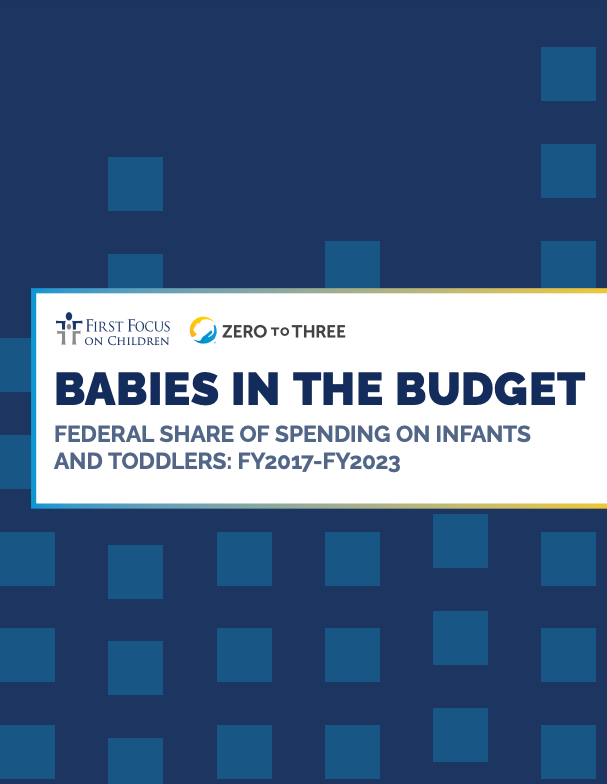Babies in the Budget — a report co-authored by ZERO TO THREE and First Focus on Children — examines federal investment in the nation’s youngest children across more than 120 programs. Our analysis finds that the federal government invests very little in babies and toddlers, despite the fact that they make up 3.4% of the U.S. population. This underinvestment is a missed opportunity to nurture the next generation during its most critical period of development and to address economic and social inequities.
The United States is home to 11.4 million babies and toddlers, who make up 3.4% of our nation’s population. Yet, we spend just 1.5% of the federal budget on programs that support infants and toddlers – an underinvestment in our youngest children during the years in which they are developing a foundation that will shape the rest of their lives. The Administration and Congress should reexamine and redouble our nation’s commitment to infants and toddlers, prioritizing increased investments to meet the needs of all our young children, especially those facing the biggest barriers to reaching their potential.
The years between birth and age three are unique in human development, laying the foundation for all that follows. Infants and toddlers undergo the most rapid physical, cognitive, and emotional development of their lives, forming one million neural connections a second. By age three, the human brain has reached 80% of its adult volume as young children develop trillions of connections creating the capacity to think and reason, acquire language, form relationships and control their bodies. All later learning and relationships are built on this foundation, impacting children for a lifetime.
Not all children have the resources to ensure a strong foundation. Inequities start at birth and even before. The State of Babies Yearbook 2022 shows that 40% of babies and toddlers live in families with low income or in poverty. The figures are higher for children of color: Two-thirds of Black and Indigenous infants and toddlers and more than half of Hispanic infants and toddlers live in families with low-income or in poverty. The RAPID Survey project found that economic insecurity and material hardship in families with very young children increased during the COVID-19 pandemic, especially in families of color, with corresponding increases in parental and child emotional distress. Babies in economically stressed families are more likely to live in unstable housing or have families with high food insecurity that can lead to chronic unrelenting stress that undermines brain development. Promoting equity starts with early investments into all babies’ healthy development that will yield long-term returns through better health and productivity.
Federal investments in families with young children have the potential to address these inequities and support the strong early foundation babies and toddlers need to succeed in school and as adults. If federal investments followed the science of early brain development, we would prioritize public investments in the first three years of life based on the understanding that young children develop and thrive in the context of strong family relationships and safe and healthy environments. We would invest in a strong economic foundation for infants and toddlers to meet their basic needs, reduce early stress, and support their overall well-being. We would ensure they and their families have access to quality health care, clean environments and comprehensive supports to ensure their good health. And we would guarantee that infants, toddlers, and their families have access to high-quality positive early learning experiences that nurture and support their development. We would pay special attention to families that experience economic instability, hardship, systemic racism and emotional distress, which can undermine young children’s development. These types of investments would deliver a great return, for example, high-quality birth-to-five early learning programs yield a return of 13% per annum.
